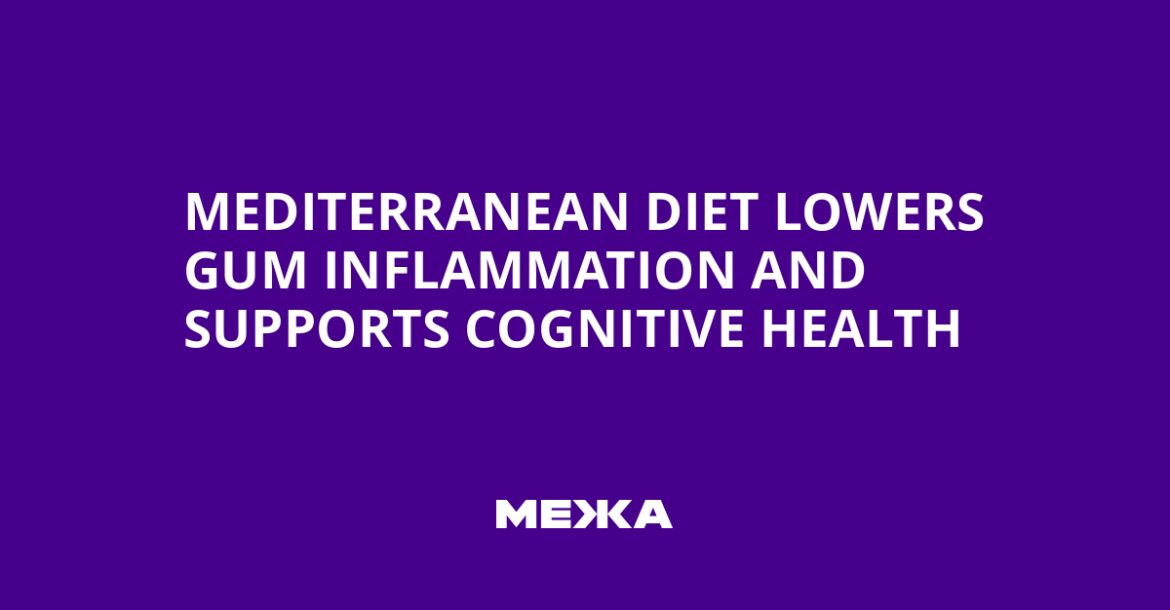Recent data indicate that adhering to a Mediterranean diet helps reduce gum inflammation, which in turn lowers the risks of chronic diseases and cognitive decline, including dementia.
According to Dr. Andrew Friman, head of the Department of Cardiovascular Disease Prevention at National Jewish Health (Denver), there is a strong scientific basis linking gum health and systemic inflammation: these processes are interconnected.
“We have long known that healthy periodontal tissues are linked to cardiovascular diseases, and vice versa – they are interconnected. It is also known that people with periodontal disease usually exhibit markers of inflammation.”
– Dr. Andrew Friman
How the Mediterranean diet affects oral health and overall health
Inflammation can spread from the blood vessels to other organs – kidneys, lungs, liver, and brain. According to studies, dementia and other forms of cognitive decline are linked to vascular problems and inflammation.
Experts emphasize that a clean, predominantly plant-based diet with an emphasis on vegetables, whole grains, legumes, seeds, and substantial amounts of extra-virgin olive oil can reduce inflammation and support overall health of the body.
“The true principle of the diet is a plan that puts plants first, not meat: this significantly reduces inflammation,” noted Friman.
In the United Kingdom, 200 participants were recruited: they underwent dental examinations, provided blood samples, and completed dietary questionnaires. The results showed that low adherence to the Mediterranean diet and higher intake of red meat were associated with increased severity of periodontal disease.
“Low adherence to the Mediterranean diet and higher red meat intake were associated with the degree of severity of periodontal disease.”
– Luigi Nibali
It was also found that a larger share of vegetables, legumes, and dairy products is associated with lower levels of the inflammatory marker C-reactive protein, and there were notable positive trends regarding fruit consumption and olive oil.
“Greater consumption of vegetables, beans, and dairy products is linked to lower levels of C-reactive protein; there were also noticeable favorable trends regarding fruits and olive oil.”
– Luigi Nibali
Although these findings do not surprise scientists, they emphasize that dental care is an important part of overall health. If the diet aligns with healthy lifestyle principles, this is often reflected in the condition of your teeth.
“While these findings are not surprising, this is a good reminder to pay attention to your teeth. And following a diet more aligned with body health can improve your dental health.”
– Dr. Andrew Friman
Data from the studies were collected through dental examinations, blood tests, and dietary questionnaires, confirming the close link between nutrition, inflammatory markers, and periodontal status.
The takeaway and outlook are that caring for your diet and basic dental care are integral to overall well-being. A diet focusing on plant-based foods, whole grains, and moderate use of olive oil helps reduce inflammation and supports oral health.
If you have questions about the impact of nutrition on your teeth or want to learn more about a healthy diet for the whole body, consult a qualified professional. A proper approach to nutrition and dental care can make a significant step toward long-term health.
Remember: maintaining healthy gums and teeth is part of overall body health, and following a balanced diet reduces inflammation and supports cognitive function even in later life.


Dining and Cooking